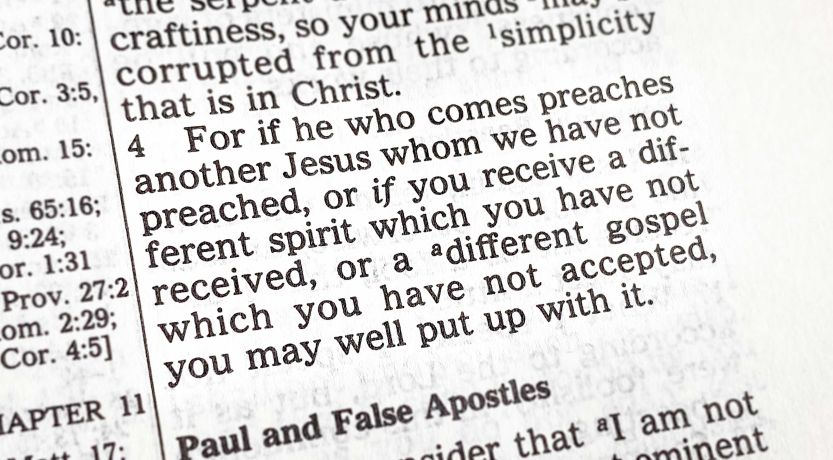What’s the Meaning of 2 Corinthians 11:4? Another Jesus? A Different Gospel?
In 2 Corinthians 11:4, Paul warned of “another Jesus,” “a different spirit” and a “different gospel.” Are Paul’s warnings still relevant today?

What does 2 Corinthians 11:4 say?
“For if he who comes preaches another Jesus whom we have not preached, or if you receive a different spirit which you have not received, or a different gospel which you have not accepted—you may well put up with it!”
This post will analyze this crucial verse phrase by phrase to highlight the profound reverberations this warning still has today.
“For if he who comes preaches”
The English word preach (and its variants) occurs 135 times in the New King James Version of the New Testament.
Consider the following examples:
- The first verse to use it in the New Testament describes John the Baptist preaching in the wilderness, saying, “Repent, for the kingdom of heaven is at hand!” (Matthew 3:1-2).
- The second verse that uses it is about Jesus, who came preaching, “Repent, for the kingdom of heaven is at hand” (Matthew 4:17).
- Jesus later sent out His 12 disciples to preach, “The kingdom of heaven is at hand” (Matthew 10:7).
The apostle Paul emphasized the need for a preacher. He asked the question, “How shall they hear without a preacher?” (Romans 10:14). For people to have the opportunity to hear and live by the truth, it must be preached (verse 17).
As seen with the above examples, biblical preaching is often linked with proclaiming the message of the Kingdom of God. It also includes the message of repentance. Therefore, a true preacher of the biblical gospel will focus on repentance and announcing the coming Kingdom of God.
A true preacher of the biblical gospel will focus on repentance and announcing the coming Kingdom of God.
This message is often totally overlooked by preachers today.
Paul faced the same problem in his time as he heard of ministers preaching a message devoid of those two elements. He determined that although they appeared as “ministers of righteousness,” they preached a counterfeit message inspired by Satan (2 Corinthians 11:13-15).
Jesus gave this same warning beforehand, reminding His disciples of “false prophets” that look like sheep but are “ravenous wolves” (Matthew 7:15-16; see also Acts 20:29).
Paul wrote 2 Corinthians 11:4 to seriously counsel his readers to remember that there are deceptive ministers who preach false messages.
To learn more about how to discern false teachers, read our article “False Prophets.”
“Another Jesus whom we have not preached”
Paul explained the message false teachers would teach.
Some will come preaching Jesus—but a false Jesus! The Jesus they preach is not the Jesus Christ of the Bible, but an impostor Jesus. In His Olivet Prophecy, Jesus also warned of many coming in His (Jesus’) name who would “deceive many” (Matthew 24:5).
Tragically, this results in confused people who believe in God, but have diverse beliefs, many of which negate the words of the true Jesus and the Bible.
Consider the following examples:
- Some preach God is a trinity—three persons in one—whereas others teach God is one and Jesus was created.
- Some preach that humans are inherently good, whereas others teach that we are born with original sin.
- Some preach that now is the only day of salvation, whereas others teach that all people (even atheists) will go to heaven if they are good people.
- Some preach that people who practice homosexuality and transgenderism should be accepted by Christians just as they are, whereas others say that they are condemned to burn forever in hell.
What do these examples of contradictory teachings have in common?
They are all false.
They are the result of believing and preaching a “different Jesus.”
To learn more, read “Will the Real Jesus Please Stand Up?” and “Five Damaging Beliefs About Jesus Christ.”
“Or if you receive a different spirit which you have not received”
The apostle John referred to God’s Spirit as the “Spirit of truth” (John 14:17; 15:26; 16:13).
So, what is this “different spirit” in 2 Corinthians 11:4?
John called it the “spirit of error” (1 John 4:6). He warned us to “not believe every spirit” but to “test the spirits, whether they are of God” (verse 1).
Paul also urged us to “test all things” and “hold fast what is good” (1 Thessalonians 5:21). This means we need to discern and filter all things in life and know the difference between good and bad, right and wrong (Hebrews 5:14).
By what standard should we discern all things? The Bible provides the following standards:
- “To the law and to the testimony! If they do not speak according to this word, it is because there is no light in them” (Isaiah 8:20).
- “[They] searched the Scriptures daily to find out whether these things were so” (Acts 17:11; compare John 5:39).
- “Be diligent to present yourself approved to God, a worker who does not need to be ashamed, rightly dividing the word of truth” (2 Timothy 2:15).
In other words, we should diligently study God’s law and words to understand His truth and then use His truth to discern all of the spirits we come across.
To learn more, read “Modern False Prophets: Beware!”
“Or a different gospel which you have not accepted”
The result of preaching an alternative Jesus with a foreign spirit will be a very different gospel from the one the real Christ preached.
Though this was a warning to the Corinthians, Paul also rebuked the Galatians for accepting a “different gospel” (Galatians 1:6-7).
It’s important to understand that the perversion of the true gospel was occurring both within and outside the early Church—and those perversions exist to this very day! In fact, most churches accept an alternative gospel as orthodox teaching and don’t even realize it.
The gospel preached by most churches today focuses almost solely on the personage of a false Jesus Christ. Instead of proclaiming His genuine teachings, they use Jesus’ name to present traditions and ideas foreign to the Bible.
Some examples include a triune God, nonbiblical holidays, infant baptism, heaven as the reward of the saved and an ever-burning hell as a place of punishment for nonbelievers.
Many worship and believe sincerely, but in error. True believers must seek to worship in both sincerity and truth (John 4:23-24).
To learn more, read “Messiah’s Message: Repent” and “Messiah’s Message: Believe in the Gospel.”
“You may well put up with it!”
In today’s world, tolerance seems to be society’s highest ideal. But when it comes to error, falsehoods, perversions and sin, Christians are not to be tolerant. This doesn’t mean we should be like the Pharisees and “despise others” (Luke 18:9), but we should diligently seek to worship God in truth and remove error from our lives.
The Church of God is also responsible for warning the world of sin’s consequences and preaching a message of change through repentance. To learn more about this part of the Church’s mission, read “Cry Aloud, Spare Not” and “This Gospel Will Be Preached.”
As we head into the end of this age, depravity is sinking to new lows. But you don’t have to follow our world into moral decay. You can repent to God and seek to worship Him in sincerity and truth.
As we enter the end of the age, 2 Corinthians 11:4 is just as relevant as it was 2,000 years ago. We must be vigilant against teachings that represent “another Jesus,” “a different spirit” and a “different gospel.”
That is the crucial message and meaning of 2 Corinthians 11:4.
Date Posted: April 24, 2023



